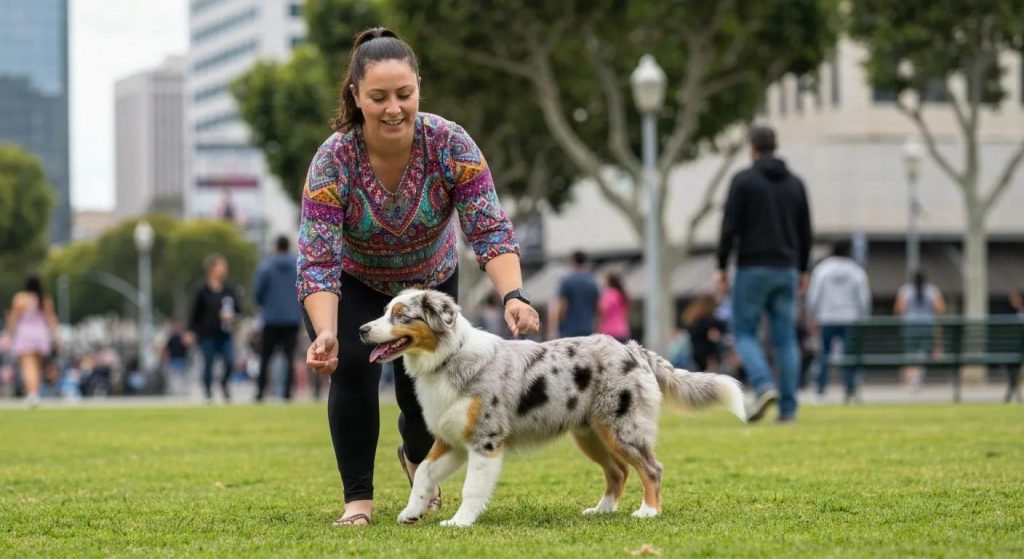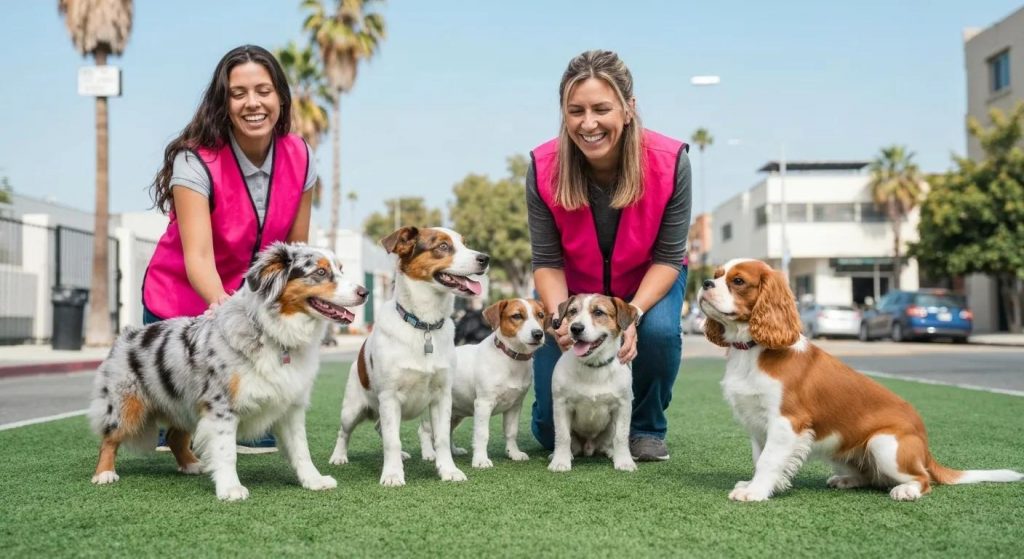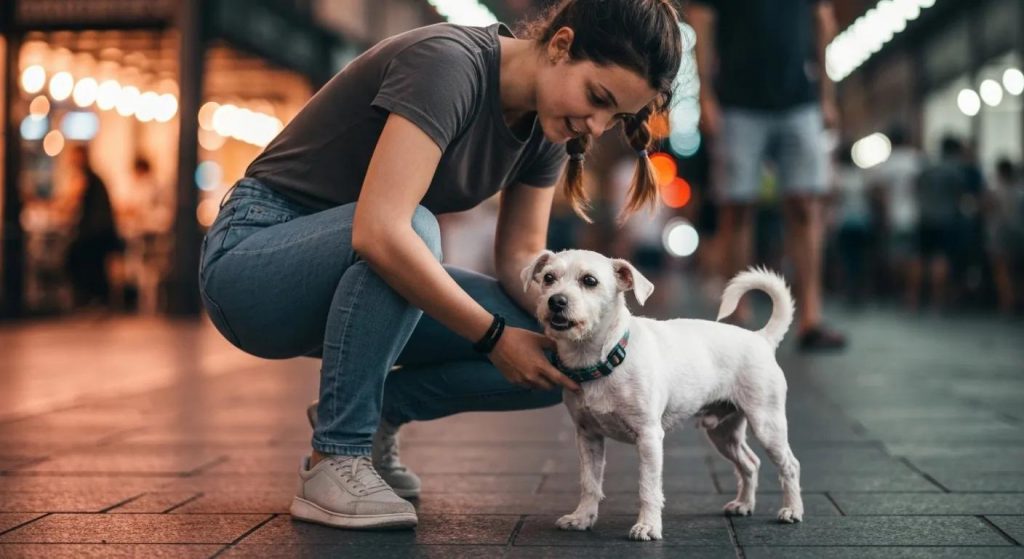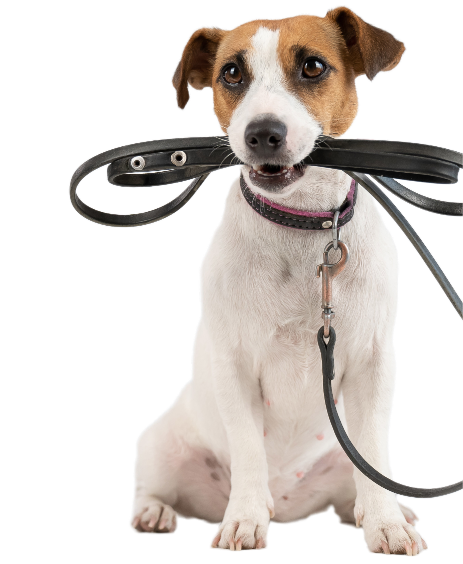
LA Dog Training: Cultivating a Well-Behaved Companion in the City of Angels
Nurturing a confident, obedient dog in Los Angeles is best achieved with expert guidance designed for city living—an investment that turns everyday challenges into a harmonious partnership. Dog training in LA tackles common issues like leash reactivity, apartment-related anxieties, and insufficient socialization by blending proven methods with skilled oversight. This guide will walk you through the best puppy-raising practices, effective behavior modification strategies, the advantages of obedience classes, solutions for aggressive behaviors, the benefits of board-and-train programs, integrating daycare, and crucial tips for selecting the right trainer. By the end, you’ll be well-equipped to team up with a premier local professional to achieve lasting positive results for your furry friend.
What Are the Top Puppy Training Strategies for Los Angeles?

Puppy training in LA establishes the groundwork for a lifetime of good behavior by introducing early socialization, fundamental commands, and positive reinforcement techniques that help prevent anxiety and future behavioral issues. Structured puppy classes help young dogs adjust to the sights, sounds, and people of urban environments while reinforcing desirable actions that build confidence and focus.
How Does Early Socialization Shape Puppy Behavior in Urban LA?
Early socialization involves gradually introducing puppies to city life—traffic sounds, busy sidewalks, various dog parks—teaching them to remain calm rather than fearful. By associating new experiences with treats and praise, puppies develop positive connections that reduce stress and facilitate smoother adjustments to complex urban settings. This process also enhances impulse control, making subsequent obedience training more effective and reliable.
Insufficient Socialization, Lack of Activity, and Urban Environments Are Linked to Social Fearfulness in Dogs
This study strongly supports the article’s point that early socialization, especially in urban settings, is vital for preventing fear and promoting a calm demeanor in puppies.
What Essential Obedience Commands Should Puppies Master?
Before completing their initial puppy classes, every dog should be proficient in core cues that ensure communication and safety:
- Sit on command to manage greetings with visitors.
- Stay in place until released, ensuring control in bustling areas.
- Come immediately when called, crucial for avoiding hazardous situations.
- Leave it to ignore dropped items on crowded city streets.
These commands form the basis for more advanced training and establish a consistent framework for interaction between owners and their dogs.
How Does Positive Reinforcement Enhance Puppy Training Outcomes?
Positive reinforcement boosts training success by rewarding desired actions—such as offering treats, praise, or play—encouraging puppies to associate commands with pleasant experiences. This method strengthens the neural connections for desired responses and cultivates trust, reducing resistance and stress during learning. Over time, dogs learn to apply commands across different locations, making their obedience more dependable on any LA street or beach.
Where Can You Find Top Puppy Training Classes in Los Angeles?
For structured small-group sessions and personalized one-on-one coaching, explore the “family dog training programs” at Topanga Pet Resort, which specialize in urban puppy socialization and manners. Their certified trainers incorporate exercises suitable for apartment living with excursions to city parks, cultivating well-adjusted, adaptable pups ready for life in Los Angeles.
How Can Dog Behavior Modification Address Common Issues in LA Dogs?
Behavior modification transforms problematic responses—such as aggression and anxiety—through systematic desensitization, counterconditioning, and controlled exposure, effectively reshaping a dog’s emotional reactions. By pinpointing each dog’s triggers and replacing fearful or aggressive reactions with calm, rewarded behaviors, modification programs restore balance and safety.
What Are the Most Frequent Behavioral Problems Among Los Angeles Dogs?
Urban environments often contribute to:
- Leash reactivity towards people and other dogs.
- Separation anxiety when left alone in apartments.
- Territorial aggression stemming from confined living spaces.
- Noise phobias triggered by city sounds like sirens and construction.
Identifying these patterns is the crucial first step toward effective intervention.
How Does Behavior Modification Help Manage Aggression and Anxiety?

Behavior modification addresses aggression and anxiety by interrupting negative association cycles: dogs learn to respond positively to triggers through gradual exposure paired with highly rewarding treats. This approach lowers stress hormones, reinforces calm body language, and builds confidence in challenging situations, ultimately leading to predictable and peaceful behavior.
How Is Leash Reactivity Managed in Urban Settings?
Leash reactivity is managed by teaching focus and impulse control through distance-based training exercises:
- Start at a distance where triggers are manageable.
- Use attention cues (“look at me”) to redirect focus.
- Reward calm behavior with treats and praise.
- Gradually reduce the distance as tolerance increases.
This methodical approach incorporates predictability and rewards, making city walks more relaxed and secure.
What Are the Key Advantages of Obedience Classes in Los Angeles?
Obedience classes in LA offer structured learning that enhances communication, builds trust, and addresses city-specific challenges like crowded parks and ride-share pickups. Professional instructors guide both dog and owner through proven routines that improve the quality of your relationship and simplify daily interactions.
How Do Obedience Classes Improve Dog-Owner Communication?
Classes teach owners how to deliver cues clearly, time rewards effectively, and handle their dogs consistently—ensuring dogs understand expectations. Better communication reduces misunderstandings and fosters a cooperative dynamic that leads to quicker command compliance in complex urban environments.
What Training Techniques Are Commonly Used in LA Obedience Programs?
Obedience programs typically employ:
- Positive reinforcement to reward correct responses.
- Clicker training for precise feedback timing.
- Targeting exercises to develop focus and direction.
- Structured recalls to build reliable off-leash reliability.
These methods encourage engagement and accelerate skill retention.
How Long Do Typical Obedience Classes Last?
Most group obedience series run for 6–8 weeks, with one-hour sessions weekly to allow for practice and reinforcement. Owners often notice significant improvements after the third session, and continued success relies on consistent practice at home between classes.
Can Obedience Classes Aid in Socialization for City Dogs?
Absolutely, obedience classes include controlled group activities that expose dogs to peers under expert supervision. This structured socialization teaches polite interactions, helps manage over-excitement, and prevents future conflicts in off-leash areas and dog-friendly public spaces.
How Do Aggressive Dog Trainers in LA Address Challenging Behaviors?
Expert aggressive dog trainers in Los Angeles combine controlled management, behavior modification, and gradual confidence-building exercises to safely address fear-based and territorial aggression. Their programs focus on redirecting arousal and reinforcing calm responses in high-stress situations.
What Types of Aggression Are Frequently Seen in Los Angeles Dogs?
Aggression in city dogs often appears as:
- Fear-based aggression when approached too quickly.
- Territorial aggression when defending small living spaces.
- Resource guarding over items or food in multi-pet homes.
- Leash aggression towards unfamiliar passersby.
Identifying the specific type of aggression is key to implementing targeted interventions.
What Behavior Modification Techniques Are Effective for Aggression?
Successful techniques include counter-conditioning fearful reactions with high-value treats, desensitization through gradual exposure, and impulse-control exercises that shift a dog’s focus from perceived threats to owner cues. Over time, dogs learn to choose calm behaviors instead of defensive reactions.
How Can Owners Support Aggressive Dog Training at Home?
Owners can reinforce progress by maintaining consistent routines, using clear and calm commands, and practicing exercises daily in low-distraction environments before moving to busier settings. Consistency and gradual increases in challenge ensure lasting behavior change.
What Specialized Aggressive Dog Training Programs Does Topanga Pet Resort Offer?
Topanga Pet Resort provides:
- Intensive One-on-One Sessions focused on personalized desensitization plans.
- Board and Train for Reactivity, featuring daily management of triggers.
- Group Confidence Building Workshops to generalize calm behavior in multi-dog environments.
Their certified behaviorists tailor each program to the individual dog’s needs and rate of progress.
What Are the Advantages of Board and Train Programs in Los Angeles?
Board and train programs immerse dogs in a structured setting where professional instructors provide consistent, round-the-clock guidance, accelerating learning and ensuring clear reinforcement of routines. This approach leads to rapid improvements in impulse control, obedience, and stress management.
| Program Type | Duration | Primary Focus |
|---|---|---|
| Residential Board & Train | 2–4 weeks | Basic obedience and manners |
| Intensive Behavior Boarding | 4–6 weeks | Reactivity and anxiety management |
| Puppy Board & Train | 2–3 weeks | Early socialization and foundation |
Benefits of Structured Dog Training Programs
This citation confirms the benefits of both board and train programs and dog daycare in addressing behavioral issues and fostering socialization in city dogs through structured and consistent environments.
How Does a Board and Train Program Function for Urban Dogs?
Dogs reside at the resort, participating in daily training sessions, structured playtimes, and supervised socialization under expert care. Trainers reinforce lessons during feeding, walking, and rest periods to maximize learning and behavioral consistency.
What Behavioral Issues Can Board and Train Address Effectively?
Board and train programs effectively manage leash pulling, separation anxiety, noise phobias, and basic manners by combining repeated exposure with reward-based feedback and owner coaching for ongoing maintenance.
How Long Do Board and Train Programs Typically Last?
Most programs range from 2–6 weeks, depending on the dog’s age, temperament, and specific training objectives. Shorter stays focus on manners, while longer sessions allow for more in-depth work on complex issues like aggression.
What Makes Topanga Pet Resort’s Board and Train Stand Out in LA?
Topanga Pet Resort offers personalized enrichment activities, daily video updates from trainers, and a nurturing facility environment that minimizes stress and promotes rapid learning. Owners also receive a customized transition plan to ensure training gains are maintained at home.
How Can Dog Daycare with Training Support Well-Behaved City Dogs?
Dog daycare combined with training integrates social skills and basic obedience into daily play, transforming group interactions into learning opportunities that address urban challenges like limited off-leash space and desensitization to noise.
What Socialization Benefits Do Daycare Programs Provide for LA Dogs?
Daycare exposes dogs to various play styles, teaching bite inhibition, polite greetings, and stress-management cues under expert supervision. This peer-to-peer learning accelerates confidence and reduces behavioral problems at home.
How Are Enrichment Activities Incorporated Into Daycare Training?
Certified staff integrate puzzle feeders, brief training sessions, and obedience drills between play periods to engage both the mind and body. This balanced approach prevents boredom and fosters focus during real-world outings.
Can Daycare Help Alleviate Separation Anxiety in City Dogs?
Yes—regular daycare visits help build independence through gradual practice with owner absences, combined with positive interactions and structured routines that reassure anxious dogs and reduce stress at home.
What Should Los Angeles Dog Owners Consider When Choosing a Trainer?
Selecting the right trainer involves evaluating qualifications, training methods, costs, and compatibility with your dog’s temperament and your family’s lifestyle. A clear understanding of credentials, philosophies, pricing, and program expectations ensures an informed decision.
How Do Training Philosophies Differ: Positive Reinforcement vs. Balanced Training?
| Philosophy | Methodology | Owner Involvement | Desired Outcome |
|---|---|---|---|
| Positive Reinforcement | Reward-based cue reinforcement | Daily praise and treats | Confidence and trust |
| Balanced Training | Combines rewards with corrections | Consistent boundary setting | Rapid obedience in all situations |
While both approaches have merits, modern standards increasingly favor force-free positive methods for long-term well-being.
What Questions Should You Ask Before Booking a Training Program?
- What certifications and experience do your trainers possess?
- What methods and equipment are utilized during sessions?
- How will progress be tracked and communicated?
- What post-training support is provided for home practice?
Dogs flourish when training is adapted to their environment, temperament, and family dynamics. Partnering with a reputable provider offers expert guidance, proven techniques, and consistent reinforcement—essential elements for urban canine success. Ready to enhance your dog’s behavior in Los Angeles? Contact Topanga Pet Resort today to explore personalized training options and reserve your spot in our upcoming programs. Our dedicated team is here to support you and your beloved hound every step of the way.



